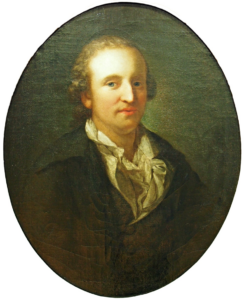To nature
(Poet's title: An die Natur)
Set by Schubert:
D 372
[January 15, 1816]
Part of The Theresa Grob Album
Süße, heilige Natur,
Lass mich gehn auf deiner Spur;
Leite mich an deiner Hand,
Wie ein Kind am Gängelband.
Wenn ich dann ermüdet bin,
Sink ich dir am Busen hin;
Atme süsse Herzenslust
Hangend an der Mutterbrust.
Ach, wie wohl ist mir bei dir!
Will dich lieben für und für.
Lass mich gehn auf deiner Spur,
Süße, heilige Natur!
Sweet, holy nature,
Let me walk in your tracks!
Lead me by the hand,
Like a child on reins!
Then when I am exhausted
I shall sink down on your bosom,
And breathe the sweet delight of the heart
Hanging on my mother’s breast.
Oh, how good it is for me being with you!
I am going to love you for ever and ever.
Let me walk in your tracks!
Sweet, holy nature!
All translations into English that appear on this website, unless otherwise stated, are by Malcolm Wren. You are free to use them on condition that you acknowledge Malcolm Wren as the translator and schubertsong.uk as the source. Unless otherwise stated, the comments and essays that appear after the texts and translations are by Malcolm Wren and are © Copyright.
☙
Themes and images in this text:
Breath and breathing Chest / breast Eternity Leading and directing Mother Nature Sweetness
Stolberg’s devotion to nature is related to his partisan membership of the Göttinger Hainbund, a group of poets that were reacting against the perceived intellectualism and French influenced classicism of so much literature in the age of the Enlightenment. Their bête noire was Christoph Martin Wieland (1733 – 1813), whose detached and seemingly unfeeling style (even when writing about intense human experience) was felt to typify the artificiality of ‘civilisation’. A return to ‘nature’ was seen as a way of being more fully human, more authentic, more sincere.
In Stolberg’s ‘An die Natur‘ the poet states that he wants to sink exhausted onto nature’s bosom and let mother nature suckle him herself. The image of breast feeding relates explicitly to contemporary debates about culture. In an age in which breast-feeding was seen as unlady-like (upper class children were farmed out to wet-nurses) and men’s hair was covered either with a wig or powder, defence of ‘nature’ was often interpreted as a dangerously political stance.
He does not just see himself as a baby, but also as a toddler. When learning to walk, he also wants to follow in nature’s footsteps or be held by reins. This is an implicit rejection of the prevailing system of education, which tried to beat natural urges and tendencies out of the child by strong discipline and chastisement. The end result is that we will love (rather than fear) our parent, in this case nature itself.
☙
Original Spelling An die Natur Süße, heilige Natur, Laß mich gehn auf deiner Spur, Leite mich an deiner Hand, Wie ein Kind am Gängelband! Wenn ich dann ermüdet bin, Sink ich dir am Busen hin, Athme süsse Herzenslust Hangend an der Mutterbrust. Ach, wie wohl ist mir bey dir! Will dich lieben für und für; Laß mich gehn auf deiner Spur, Süße, heilige Natur!
Confirmed by Peter Rastl with Deutsche Chronik. auf das Jahr 1775. herausgegeben von M. Christ. Fried. Daniel Schubart. Ulm, gedruckt bey Christian Ulrich Wagner, und zu finden in Augsburg, bey Conrad Heinrich Stage. 92. Stück. Den 16. November, 1775, page 733; and with Gedichte der Brüder Christian und Friedrich Leopold Grafen zu Stolberg. Erster Theil. Wien, 1821. Im Verlage bei J.B. Wallishausser. Hamburg, bei Perthes und Besser, page 113.
To see an early edition of the text, go to page 110 [126 von 164] here: http://digital.onb.ac.at/OnbViewer/viewer.faces?doc=ABO_%2BZ220349107


